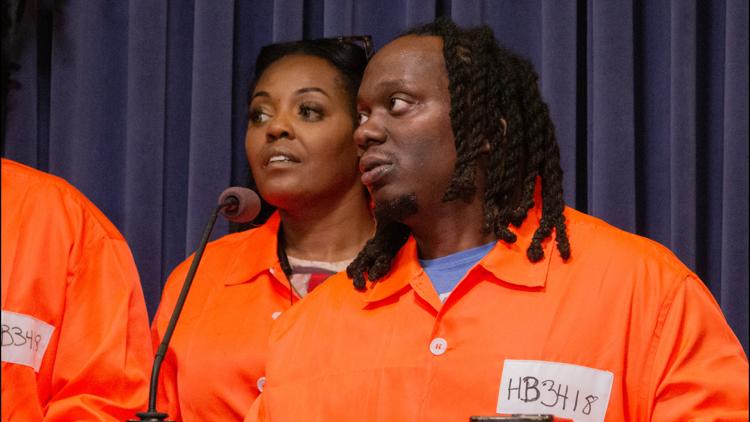SPRINGFIELD, Ill. — Illinois legislators this week approved a bill to restructure an oversight board in charge of distributing state money to courts that provide prison alternatives, while other criminal justice measures introduced throughout the session remain stalled.
House Bill 4409 would change the makeup of the Adult Redeploy Illinois Oversight Board to include 20 members, including two individuals who have previously participated in an Adult Redeploy program. Currently, it is comprised of state officials and probation officers, but no board members have the experience of being a participant in a diversion court program.
Under current law, the board provides formula-based funding to dozens of diversion programs in courts around the state, but the bill would change that to a grant-based program that’s subject to appropriation in future budgets. It would also give the board authority to penalize courts for not meeting agreed-upon goals for reducing the number of probation-eligible individuals who are transferred to state correctional facilities. The governor’s office proposed spending $14.6 million on the Adult Redeploy Illinois program in the upcoming fiscal year, roughly level from the current year.
The measure also changes the term for participants in the program from “offenders” to “justice-impacted individuals,” a new common practice with terminology in criminal justice legislation. It needs only a signature from the governor to become law.
Reentering Illinois
Over the last decade, Illinois’ prison population has declined from a high of nearly 50,000 in 2013 to a low of nearly half that at the peak of the COVID-19 pandemic and associated temporary relocation measures. More than 100,000 Illinoisans spent time on mandatory supervised release – a form of parole – in 2022, according to the Illinois Criminal Justice Information Authority.
While criminal justice reform advocates have celebrated that trend, they also say Illinois needs to build a statewide reentry program, especially as almost 500 people return to society under a new sentence recalculation law and as Gov. JB Pritzker plans to close and rebuild two prisons.
Read more: Stateville may close as early as September under Pritzker’s prison plan | Pritzker signs bill overhauling mandatory supervised release
The new sentencing law required the Department of Corrections to recalculate sentences by accounting for a person’s time served in a local county jail before arriving in prison. Approximately 1,800 individuals had sentences recalculated with 475 being released from IDOC facilities earlier than they would have been as of May, according to IDOC spokesperson Naomi Puzzello.
Advocacy groups say change is also necessitated by the changing nature of Illinois’ prison population. Researchers from the Loyola University Chicago Center for Criminal Justice found significant change in the kinds of crimes people were serving time for over the past decade.
From 2010 to 2023, researchers found a 15 percent increase in the number of individuals exiting prison for illegal possession of a firearm while the percentage of people who were imprisoned for drug or property crime decreased. Almost 40 percent of people released in 2023 had served time for a violent crime.
But support systems for those returning to society from prison are limited, with scant programming for housing, education and job placement.
In 2020, the University of Illinois at Chicago’s Great Cities Institute noted in a report on state reentry policies that Illinois “does not set aside specific funding” to support or provide housing for those reentering society.
The Great Cities report found the system fails to support those who leave it, increasing the likelihood of recidivism.
“Many people with criminal records find themselves deprived of certain rights and stripped of opportunities for housing, education, employment, social services, and other necessities,” the report – lead authored by Timothy Imeokparia, the institute’s associate director of research and planning – reads. “All of this increases the likelihood of return to criminal activity.”
Cook County has a limited time rental assistance program through November 2026 for people returning from prison, though it does not provide immediate placement or guarantee housing to enrollees.
But even as more states establish statewide reentry programs and councils to guide their efforts to reduce recidivism, Illinois has not adopted a comprehensive plan.
“Reentry starts on day one (of incarceration),” Jennifer Vollen-Katz, executive director of prison watchdog the John Howard Association said in an interview. “We are putting people in inhumane conditions. We are not treating them well. We are not, by and large, giving them opportunities to access treatment, programs, or education.”
Speaking at a recent conference on reentry in Chicago, Deanne Benos, former assistant director of the Illinois Department of Corrections and co-founder of the Women’s Justice Institute, said new policies are necessary to curb what she described as wasteful spending that is not helping people avoid criminal lifestyles.
“We have reduced the prison population (from 2013 highs) by almost 50 percent, the budget keeps going up. Why?” she said. “Because the ‘mega prison’ is a failed model, and it will keep sucking money and creating harm until we change it.”
The amount appropriated to IDOC in fiscal year 2024 surpassed $2 billion for the first time ever. Pritzker’s fiscal year 2025 proposal decreases the allocation by $10 million, although it would remain over $2 billion.
Even without statewide reentry programs, the Center for Criminal Justice found serious recidivism rare. The three-year arrest rate for people exiting prison during the 2018 and 2019 fiscal years was just over 50 percent, though it was mostly due to technical infractions, rather than committing a separate offense, with murder being exceptionally rare.
“Less than 1 percent of people released from prison are subsequently arrested for murder,” said David Olson, professor and researcher at Loyola’s Center for Criminal Justice.
When questioned about the March stabbing and killing of 11-year-old Jayden Perkins by Crosetti Brand, a man who had been recently released from Stateville Correctional Center under orders of the state’s Prisoner Review Board, Olson wondered why few were asking how the system failed to rehabilitate Brand after years in prison.
Read more: Prisoner Review Board chair, member resign in wake of boy’s fatal stabbing by released inmate | Amid controversy at Prisoner Review Board, Pritzker calls for more training as GOP again seeks reform
“There's a lot of examination of what individual people did in that case, but no one's provided any scrutiny to what the system failed to do in that case,” he said. “What did (the system) fail to do, in terms of access to a therapeutic intervention while (Brand) was in custody and incarcerated for eight years?”
Olson noted IDOC has operated the way prison systems are designed to do.
“Before we start pointing to the Department of Corrections saying it’s all their fault, I would argue we’re getting out of prison what many people expect: it’s punitive and it incarcerates people for a set period of time,” Olson said. “That’s what it achieves with certainty.”
The Great Cities report echoed Olson’s findings.
“Even the most effective reentry programs will be largely marginal in their impact on the reentry problem until policing strategies and sentencing practices are reconsidered simultaneously,” the report states.
Stalled bills
Bills aimed at expanding support for people with criminal records have mostly stalled, some languishing for over a year, as the session nears its end.
One measure – House Bill 5219 – would eliminate mandatory minimum requirements. Illinois institutes those requirements through truth-in-sentencing policies – where people have to serve a given percentage of the sentence they received from Illinois courts – and give incarcerated people one day of sentence credit for one day served.
Right now, Illinois law limits the number of days an incarcerated person can earn to between 54 and 90 days of credit per year, meaning it takes an individual about four to seven years to earn one year of credit towards their sentence without any discretionary credit. The bill would require IDOC to recalculate sentences for the nearly 30,000 people in Illinois prisons.
House Bill 3373 would allow people who have served 35 years of a life sentence to seek earned reentry through Prisoner Review Board hearings.
One bill that has stalled in the Senate for over a year would create a pilot program to subsidize wages of people who served time in prison while establishing a tax credit for small businesses that hire people with a criminal conviction.
Through implementing local workforce navigators, House Bill 3418 would connect potential participants with businesses and be responsible for managing monthly subsidies (50 to 75 percent of an individual’s wages) with the Department of Commerce and Economic Opportunity.
Advocates said DCEO estimated costs for the pilot at about $19 million to serve up to 500 participants per year through 2028.
Other measures, House Bill 5432 and Senate Bill 3680, seek to repeal ‘crime-free’ housing and nuisance property ordinances as ordered by local governments. Currently, counties and municipalities can craft and enforce ordinances to give landlords the power to fine or evict tenants for simply contacting police or emergency services.
The Illinois chapter of the American Civil Liberties Union found such ordinances are not only disproportionately enforced on Black people and people of color, but they may violate “the First Amendment right to petition the government, due process guarantees, and federal and state prohibitions against housing discrimination.”
Senate Bill 2158 would shrink ‘banishment zones,’ where people who have previously committed sex offenses are barred from living, from 500 feet to 250 feet. These zones exist around a variety of child care institutions, but advocates say the prohibited facilities outlined in the law are so ubiquitous, people are forced into homelessness when the 500-foot radius is applied.
A provision of the bill, which Chicago 400 Alliance organizer Laurie Jo Reynolds said was suggested by higher-ups at the Chicago Police Department, removes in-home day cares from the list of barred institutions as they, too, have become overly prevalent since the COVID-19 pandemic.
People who have served prison time are not able to hold public office in Illinois but Senate Bill 2347 seeks to change that. The bill denotes anyone who served time for official misconduct would still be disqualified from holding a public office but individuals who have served time for other offenses would be qualified for public office.
All of those measures, however, remain in some form of legislative limbo while awaiting substantial committee assignments as the spring session reaches its conclusion.
Capitol News Illinois is a nonprofit, nonpartisan news service covering state government. It is distributed to hundreds of newspapers, radio and TV stations statewide. It is funded primarily by the Illinois Press Foundation and the Robert R. McCormick Foundation, along with major contributions from the Illinois Broadcasters Foundation and Southern Illinois Editorial Association.
Watch more news, weather and sports on News 8's YouTube channel



